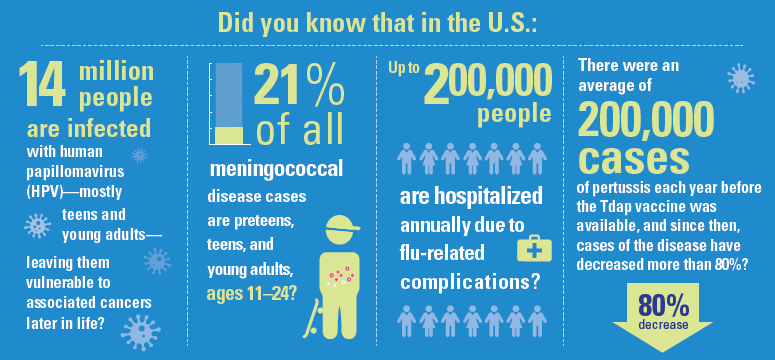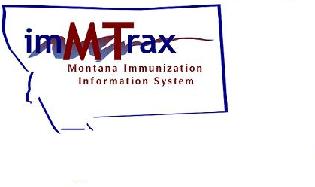Adolescent Vaccines


(Courtesy of Unity)
Snapshot of the vaccines adolescents need:
- Tetanus, Diphtheria, Pertussis (Tdap)
- Meningococcal Conjugate (MCV4)
- Human Papillomavirus (HPV)
- Influenza, each year
Information about adolescent vaccines:
Click to view each section or scroll:
Recommended Immunization Schedule for Children 7-18 Years Old
Information about Each Recommended Adolescent Vaccine
Why Vaccinate?
Vaccines protect your child from serious and deadly diseases. Vaccines reduce the risk of infection by working with the body's natural defenses to help it safely develop immunity to the disease. As children get older, they require additional doses of some vaccines for best protection. Talk to your healthcare provider if you have questions and check to make sure your child is up-to-date on all their vaccinations. More information about reasons to vaccinate.
Vaccine Safety
Vaccines are very safe and effective in preventing serious diseases. Vaccines, like any other medicine, can have side effects. Some people report having mild side effects. Common side effects can include: sore arm, pain, redness, or swelling at the injection site, fever, or headache. More information about vaccine safety.
Information about Each Vaccine
Tetanus, diphtheria, pertussis (Tdap) Vaccine
The Tdap vaccine protects your child against three diseases: tetanus, diphtheria, and pertussis (whopping cough). Tetanus is caused by a bacteria found in soil, dust and manure. Tetanus affects the neck and belly. This can lead to "locking" of the jaw so a person cannot open their mouth, swallow or breathe. Diphtheria is a very contagious bacterial disease that affects the respiratory system. The bacteria produce a toxin that can cause a sore throat, fever, and swollen glands in the neck. Pertussis is caused by a bacteria spread through direct contact when an infected person coughs or sneezes. After 1-2 weeks, pertussis can cause spells of violent coughing or choking, making it hard to breathe, eat or drink. This vaccine is a one time dose. Everyone should receive a dose of Td every 10 years. Learn more about the Tdap vaccine.
Additional Resources:
- Diphtheria, Tetanus, Whopping Cough Vaccination: What Everyone Should Know- Centers for Disease Control and Prevention
- Frequently Asked Questions about Pertussis- Centers for Disease Control and Prevention
- Diphtheria Prevention- Centers for Disease Control and Prevention
- Tdap Vaccine Information Statement- Centers for Disease Control and Prevention
Meningococcal Conjugate (MCV4) Vaccine
The Meningococcal Conjugate (MCV4) vaccine protects your child from meningococcal disease. Meningococcal disease can refer to any illness caused by the type of bacteria called Neisseria meningitidis. These illnesses are often severe and include infections of the lining of the brain and spinal cord (meningitis) and bloodstream infections (bacteremia or septicemia). This vaccine is a one time series of two doses. Learn more about the meningococcal conjugate vaccine.
Additional Resources:
- Meningitis Myths and Facts- National Foundation for Infectious Diseases
- Meningococcal Vaccine Information Statement - Centers for Disease Control and Prevention
- Meningococcal Vaccination for Preteens and Teens: Questions and Answers- Centers for Disease Control and Prevention
- Voices of Meningitis- National Association of School Nurses
Human Papillomavirus (HPV) Vaccine
The HPV vaccine protects your child from human papillomavirus or HPV. HPV infection is very common. HPV infections can cause health problems, including cervical, vaginal, and vulvar cancer in girls and penile cancer in boys. HPV infections can also cause anal cancer, throat cancer and genital warts in both boys and girls. This vaccine is a one time series of either two or three doses, depending on the age at which the series is started. Those who start the series before their 15th birthday need only two doses separated by 6 to 12 months. Learn more about the HPV vaccine.
Additional Resources:
- A Parent's Guide to Preteen and Teen HPV Vaccination- Immunization Action Coalition
- Frequently Asked Questions & Answers about HPV- Centers for Disease Control and Prevention
- HPV Survivor Stories- American Cancer Society
- HPV Vaccine Information Statement- Centers for Disease Control and Prevention
- HPV Vaccine is Safe- Centers for Disease Control and Prevention
- HPV Vaccine Safety: Questions and Answers- Centers for Disease Control and Prevention
- What Parent Should Know About HPV Vaccine Safety and Effectiveness- Centers for Disease Control and Prevention
Influenza Vaccine
The influenza or "flu" vaccine protects your child against influenza viruses. Influenza is a contagious respiratory illness caused by influenza viruses. It can cause mild to severe illness. Serious outcomes of influenza infection can result in hospitalization or death. This vaccine is administered annually. Learn more about influenza vaccine.
Additional Resources:
- Children, the Flu, and the Flu Vaccine- Centers for Disease Control and Prevention
- Influenza Vaccine Information Statement- Centers for Disease Control and Prevention
Paying for Vaccines
All children in Montana are eligible to receive low or no cost vaccines through their health plan or the Vaccines for Children Program (VFC). Learn more about the VFC Program.
Other Resources
- Age Groups and Vaccines: Adolescents- Children's Hospital of Philadelphia
- Journey of Your Child's Vaccine- Centers for Disease Control and Prevention
- Top Reasons to Get Vaccinated- National Foundation for Infectious Diseases
- Vaccinate Your Family- a program of Every Child by Two
- Vaccines for Preteens and Teens: What Parents Should Know- Centers for Disease Control and Prevention
- Voices for Vaccines- Parent-led Organization
Click to view each section or scroll:
More Information about Teen Vaccines
Why Do I Need Vaccines?
Vaccines protect you from serious and life-threatening diseases. As you get older, some of the vaccinations you got as a child begin to wear off, so you need a booster vaccine to keep you protected. Vaccines not only protect you, but also your friends and family! Talk to your parents and doctor to make sure your immunization record is up-to-date.
What Vaccines Do I Need?
- Tdap vaccine to protect against tetanus, diphtheria, and pertussis (whooping cough).
- Meningococcal conjugate (MCV4) vaccine to protect against meningococcal disease. Meningococcal disease is often severe and include infections of the lining of the brain and spinal cord (meningitis) and bloodstream infections (bacteremia or septicemia)
- Human papillomavirus (HPV) vaccine to protect against HPV infection and cancers caused by HPV. HPV infection can cause cervical, vaginal, and vulvar cancer in girls and penile cancer in boys. HPV can also cause anal cancer, throat cancer and genital warts in both boys and girls.
- Influenza "flu" vaccine each year to protect against seasonal influenza.
Tips for After Getting Shots:
- Stay seated for 15 minutes.
- Put a cool, wet cloth on your arm where the shot was given. Your arm may feel a little sore/tender, red, or swollen which is normal.
- If pain in your arm persists, take a non-aspirin pain reliever.
More Information about Teen Vaccines:
- Learn how vaccines work- The College of Physicians of Philadelphia
- Learn the journey of my vaccine- Centers for Disease Control and Prevention
- My Best Shot- California Immunization Action Coalition
Click to view each section or scroll:
Ways to Ensure Your Patients are Fully Vaccinated
Strategies to Improve Adolescent Vaccination Rates
Ways to ensure your patients are fully vaccinated
-
Use every opportunity to vaccinate your adolescent patients. Check vaccination status when they come in for sick visits and sports physicals.
-
Patient reminder and recall systems such as automated postcards, phone calls, and text messages are effective tools for increasing office visits.
-
Educate parents about the diseases that can be prevented by adolescent vaccines. Parents may know very little about pertussis, meningococcal disease, or HPV.
-
Implement standing order policies so that patients can receive vaccines without a physician examination.
Adolescent Vaccines
Tetanus, diphtheria, pertussis (Tdap)
Tdap vaccine can protect adolescents and adults from tetanus, diphtheria, and pertussis. One dose of Tdap is routinely given at age 11 or 12. People who did not get Tdap at that age should get it as soon as possible. Another vaccine, called Td, protects against tetanus and diphtheria, but not pertussis. A Td booster should be given every 10 years. Use the resources below for more information about vaccinating adolescents in your practices.
- Prevention of Pertussis- Centers for Disease Control and Prevention
- Tetanus Information- Centers for Disease Control and Prevention
Meningococcal Conjugate (MCV4)
All 11-12 year olds should be vaccinated with a single dose of a quadrivalent (protects against serogroups A, C, W, and Y) meningococcal conjugate vaccine. Since protection decreases over time, a booster dose is recommended at age 16 so teens continue to have protection during the years when they are at highest risk of meningococcal disease. Use the resources below for more information about vaccinating adolescents in your practice.
- Meningococcal Vaccination Questions and Answers- Centers for Disease Control and Prevention
- Meningococcal Disease: Technical & Clinical Information- Centers for Disease Control and Prevention
Human Papillomavirus (HPV)
Avoid missed opportunities by strongly recommending the HPV vaccine to parents of 11-12 year-olds on the same day and in the same way that you recommend Tdap and meningococcal vaccines. Use the resources below for more information about vaccinating adolescents in your practices.
- You are Key to Cancer Prevention- Centers for Disease Control and Prevention
- HPV Vaccination Algorithm- Montana Immunization Program
- HPV Vaccine Is Cancer Prevention: HPV Champion Toolkit- American Academy of Pediatrics
- HPV Survivor Stories- American Cancer Society
- Tips and Timesavers for Talking with Parents About HPV Vaccine- Centers for Disease Control and Prevention
- What Parents Should Know about HPV Vaccine Safety and Effectiveness- Centers for Disease Control and Prevention
- 5 Steps to Improve HPV Vaccination Rates- National Foundation for Infectious Diseases
Influenza
Routine annual influenza vaccination of all persons aged ≥6 months without contraindications is recommended. Use the resources below for more information about vaccinating adolescents in your practices.
- Information for Health Professionals- Centers for Disease Control and Prevention
Other Provider Resources
- Preteens and Teen Vaccine Fact Sheets and Print Materials- Centers for Disease Control and Prevention
- Vaccines for Teens: What Parents Should Know- Centers for Disease Control and Prevention
- Vaccine Information Statements- Centers for Disease Control and Prevention
- Safety Information About Specific Vaccines- Centers for Disease Control and Prevention
Provider Education
- American Academy of Pediatrics Provider Education- adolescent immunization provider education courses
- American Cancer Society Provider Education Tools- presentations, webinars, documents and toolkits about HPV
- CDC Provider Education- nursing contact hours, pharmacology and continuing medical education credit available
- MT IZ Provider Education Series- nursing contact hours available
- NFID Archived Webinars- continuing medical education credit available
- Someone You Love: The HPV Epidemic- continuing medical education credit available
Screening Checklists
- Screening Checklist for Contraindications to HPV, MenACWY, MenB, and Tdap Vaccines for Teens- Immunization Action Coalition
- Screening Checklist for Contraindications to Vaccines for Children and Teens- Immunization Action Coalition
Strategies to Improve Adolescent Vaccination Rates
- Office Strategies for Improving Immunization Rates- American Academy of Pediatrics
- Professional Tools and Resources to Improve Adolescent Vaccination Rates- National Foundation for Infectious Diseases
- Reminder Systems and Strategies for Increasing Childhood Vaccination Rates- Centers for Disease Control and Prevention
Learn about Montana's Immunization Information System (imMTrax)
Montana's Immunization Information System (imMTrax) is a confidential, computerized database that stores immunization records for Montanans of all ages. imMTrax combines records from multiple immunization providers to form one shot record.


